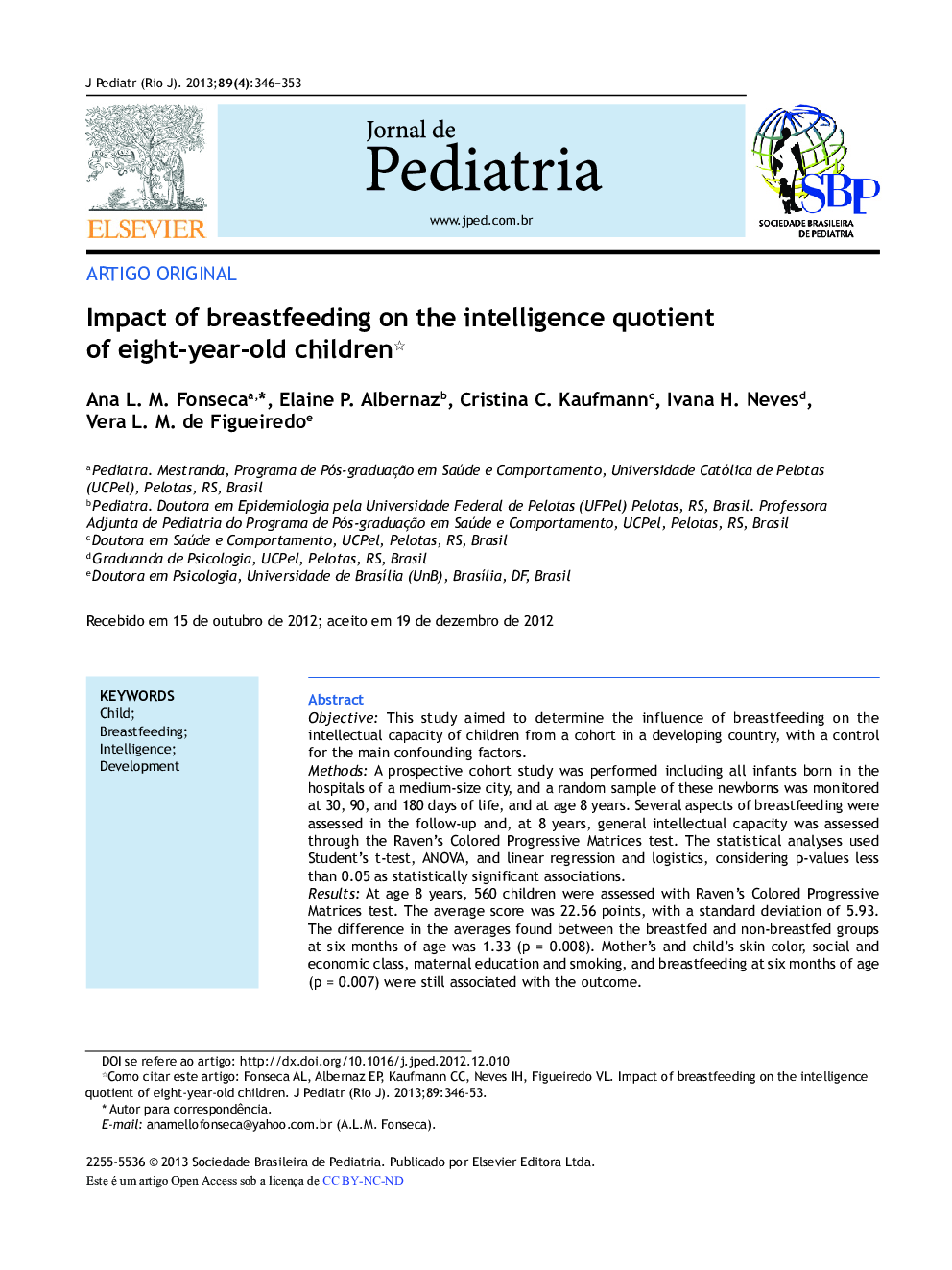| کد مقاله | کد نشریه | سال انتشار | مقاله انگلیسی | نسخه تمام متن |
|---|---|---|---|---|
| 4154609 | 1273720 | 2013 | 8 صفحه PDF | دانلود رایگان |

ObjectiveThis study aimed to determine the influence of breastfeeding on the intellectual capacity of children from a cohort in a developing country, with a control for the main confounding factors.MethodsA prospective cohort study was performed including all infants born in the hospitals of a medium-size city, and a random sample of these newborns was monitored at 30, 90, and 180 days of life, and at age 8 years. Several aspects of breastfeeding were assessed in the follow-up and, at 8 years, general intellectual capacity was assessed through the Raven's Colored Progressive Matrices test. The statistical analyses used Student's t-test, ANOVA, and linear regression and logistics, considering p-values less than 0.05 as statistically significant associations.ResultsAt age 8 years, 560 children were assessed with Raven's Colored Progressive Matrices test. The average score was 22.56 points, with a standard deviation of 5.93. The difference in the averages found between the breastfed and non-breastfed groups at six months of age was 1.33 (p = 0.008). Mother's and child's skin color, social and economic class, maternal education and smoking, and breastfeeding at six months of age (p = 0.007) were still associated with the outcome.ConclusionsChildren that were breastfed for six months or more had better performance in the general intellectual assessment, even after adjusting for the main confounding factors.
ResumoObjetivoO objetivo deste estudo foi determinar a influência do aleitamento materno na capacidade intelectual de crianças pertencentes a uma coorte de um país em desenvolvimento, controlando para os principais fatores de confusão.MétodosFoi realizado um estudo de coorte prospectiva com todos os recém-nascidos nos hospitais de uma cidade de porte médio e acompanhou-se uma amostra aleatória destes aos 30, 90 e 180 dias de vida e aos 8 anos. No acompanhamento foram avaliados diversos aspectos da amamentação e, aos 8 anos, foi realizada avaliação da capacidade intelectual geral aplicando-se o Teste de Raven. As análises estatísticas utilizaram Teste T, ANOVA e regressão linear e logística, considerando como associações estatisticamente significativas aquelas cujo valor de p foi inferior a 0,05.ResultadosAos 8 anos 560 crianças participaram da avaliação com o Teste de Raven. A média da pontuação das crianças no teste foi de 22,56 pontos com desvio padrão de 5,93. A diferença de médias entre os grupos em aleitamento materno ou não, aos seis meses, foi de 1,33 (p = 0,008). Permaneceram associadas ao desfecho, após regressão linear e logística, a cor materna e da criança, classe socioeconômica, escolaridade e tabagismo maternos e o aleitamento materno aos 6 meses de idade (p = 0,007).ConclusõesAs crianças que mamaram por seis meses ou mais tiveram melhor desempenho na avaliação intelectual geral, mesmo após ajuste para os principais fatores de confundimento.
Journal: Jornal de Pediatria (Versão em Português) - Volume 89, Issue 4, July–August 2013, Pages 346–353